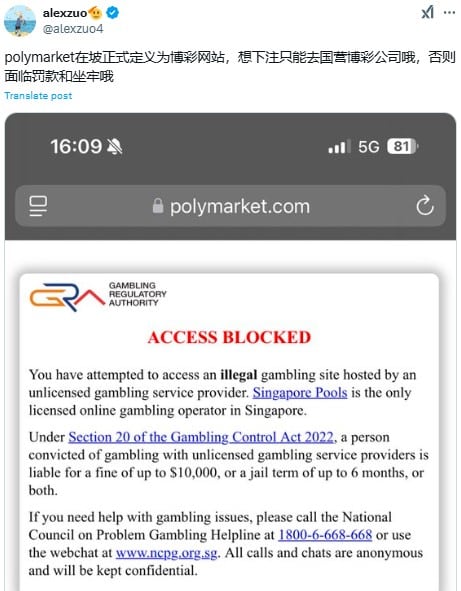Singapore has officially banned Polymarket, a decentralized prediction market platform, due to its failure to comply with the country’s stringent gambling laws. Under the Remote Gambling Act of 2014, online gambling platforms must receive government approval to operate legally in Singapore. Polymarket, which allows users to bet on real-world events using cryptocurrency, did not meet the required standards, leading to its inclusion on a growing list of blocked online services.
This move is part of Singapore’s broader efforts to enforce some of the toughest gambling regulations globally. The country permits only specific forms of betting, such as state-supervised lotteries and sports betting, while maintaining strict control over unregulated platforms. Polymarket’s decentralized model, built on the Polygon blockchain, makes it difficult for authorities to enforce regulations, as there is no central authority overseeing the platform’s operations.

This is not the first regulatory hurdle for Polymarket. In the United States, the Commodity Futures Trading Commission (CFTC) recently settled with the platform, signaling a broader crackdown on decentralized finance (DeFi) services operating in legal gray areas. The CFTC’s chair, Rostin Behnam, emphasized the agency’s commitment to policing digital asset markets and expressed concerns about unregulated platforms like Polymarket. The regulatory environment in other countries, including in the European Union and Asia, particularly in China, is also increasingly hostile toward decentralized platforms, further complicating Polymarket’s global operations.
Polymarket’s decentralized nature makes it challenging for governments to regulate, especially in jurisdictions with strict online gambling laws. This lack of a central governing body creates a complex legal landscape, with regulators struggling to define clear boundaries for platforms operating outside of traditional oversight structures.
As more countries tighten regulations on cryptocurrency and online gambling, Polymarket and other decentralized platforms are likely to face continued pushback. The ban in Singapore highlights the growing global concerns around unregulated DeFi platforms and the increasing difficulties these platforms encounter when expanding internationally.
Also read: Bitcoin Proposal Stirs Debate as NCPPR Urges Meta to Invest in Cryptocurrency





